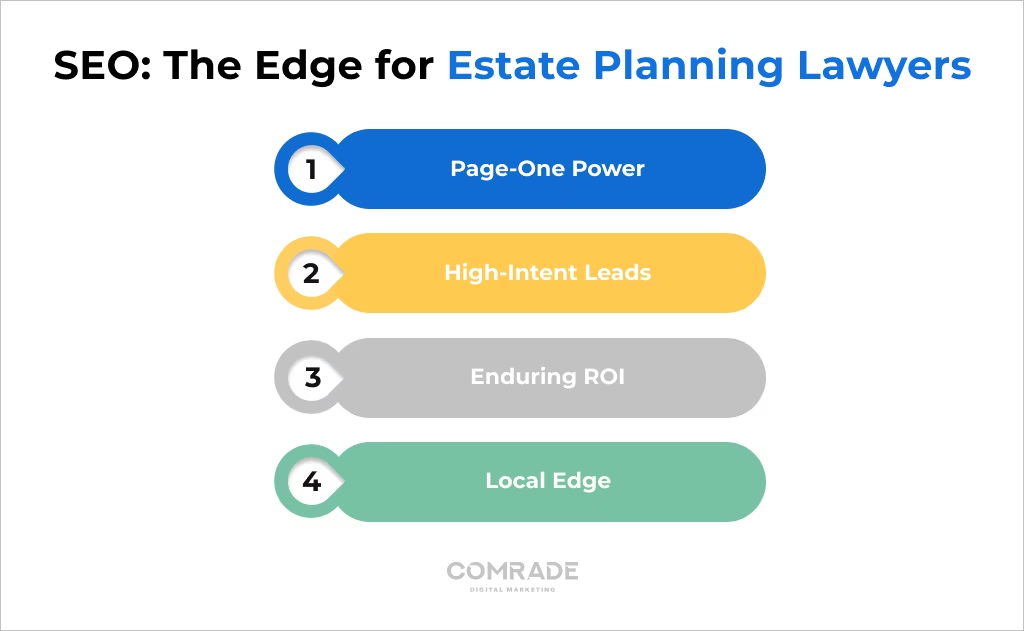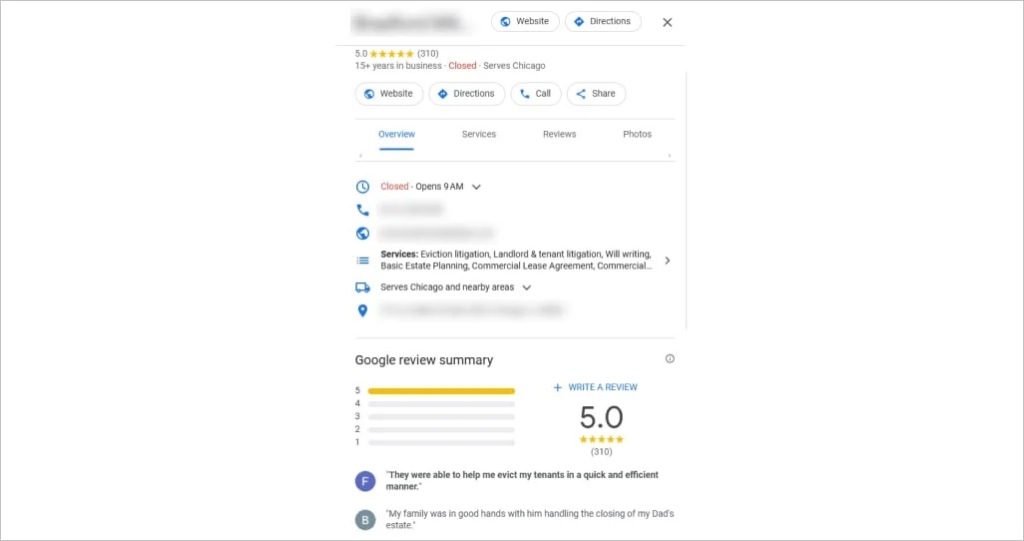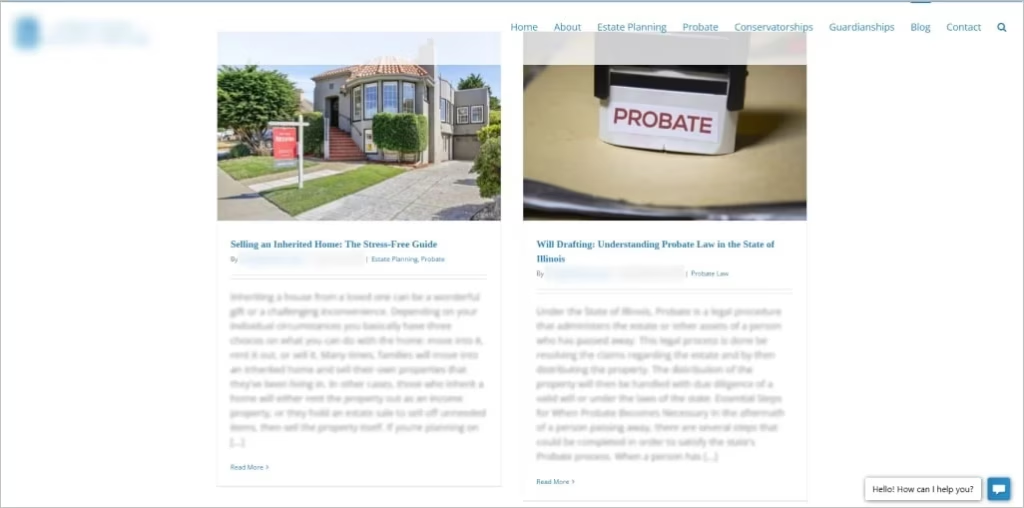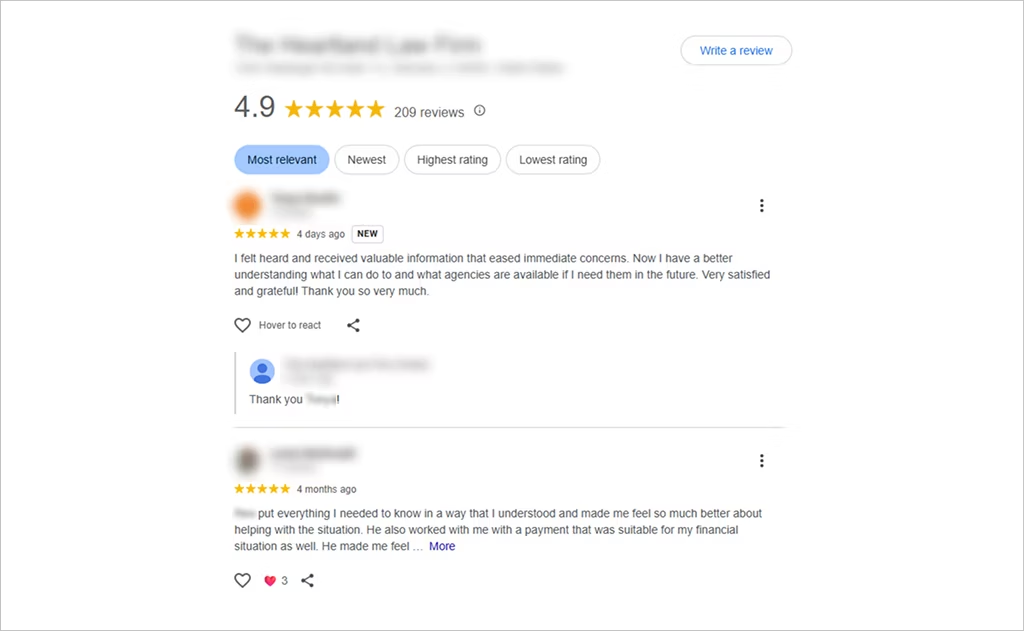Let’s run a quick experiment. Open a new tab and Google “estate planning lawyer [your city].”
Now, look at the first three firms that pop up… is your name in there?
Those spots grab over 54% of all clicks. If you don’t appear, your firm is not even an option for clients ready to hire!
In 2026, cases are won and lost on Google long before a client makes a phone call.
The good news is that Google rankings aren’t locked. You can bump a competing estate lawyer off the top spot by using these 10 proven SEO strategies. Let’s dive in!

What Is the Role of Search Engine Optimization in Real Estate Marketing?
People Google everything. What to eat. Which toilet paper to buy. And yes… which estate planning lawyer to hire.
SEO (search engine optimization) is how you convince Google to show your firm on local search results when someone searches for “estate planning services near me.”
It’s a mix of smart keyword use, helpful content, local optimization, and technical tweaks that tell search engines, “hey, my site deserves to be on page one.”
Here’s why SEO for estate planning lawyers is the difference-maker:

- Page-One Power: The firms at the top get the most clicks, as you just saw.
- High-Intent Leads: SEO brings you people ready to make a will, not just “thinking about it someday.”
- Enduring ROI: Ads stop giving you leads when your budget runs out. SEO keeps paying dividends for months and even years to come.
- Local Edge: Clients want someone in their city who knows local rules; SEO puts you in their path.
Crazy, isn’t it? Your caseload lives and dies by Google. But the upside is that if you learn to play by Google’s rules, you can stack your calendar with clients.
Top 10 Key SEO Tactics for Estate Planning Law Firms
With that said, let’s put you at the top!
These 10 SEO legal marketing tactics will boost your rankings and online visibility, while driving qualified leads straight to your practice.
1. Optimize Your Website for Local Search
You’re not competing with a Morgan & Morgan-esque firm or any other national practice.
Your real competition is the estate planning lawyer three blocks over who pops up when someone types “living trust lawyer near me.”
46% of all Google searches are local, meaning people are looking for a lawyer in your immediate city, neighborhood, or zip code.
Use this estate planning lawyer SEO playbook to win more local clients:
- Title Tags: Use clear, keyword-rich titles like “Estate Planning Attorney in Austin | Wills & Trusts.” It tells Google (and clients) exactly who you are and where you are.
- Meta Descriptions: Write short, persuasive blurbs that make people click — “Trusted estate planning lawyer serving Austin families.”
- URL Structure: Keep it clean and local (e.g., /estate-planning-attorney-austin).
- Google Business Profile: This is your modern-day Yellow Pages. Fill it with reviews, photos, and accurate info to get into Google Maps and the local 3-pack.

- Internal Linking: Connect blogs like “Do I need a living trust in Texas?” back to your main service pages so clients (and Google) follow the trail.
- Local Content: Publish posts tied to your state laws or real client scenarios because that’s what your prospects are searching for.
It’s worth repeating: local SEO for lawyers isn’t about beating giant firms nationwide. It’s about owning your backyard with the right law firm marketing techniques.
2. Create High-Quality, Relevant Content
Google doesn’t just rank law firms. It ranks answers.
That’s precisely why content is the backbone of your estate planning attorney SEO.
For instance, if you Google “What is the difference between a will and a trust?” you’ll see Bratton Law Group’s FAQ page ranking right on page one. It clearly and succinctly answers the question people are asking. That’s the beauty of great content!
How to create a robust content marketing plan:
- Hit every stage of the journey:
- Awareness: “Do I even need a will if I’m under 40?”
- Consideration: “Will vs. trust in Florida — what’s better?”
- Decision: “Best estate planning attorney in Miami.”
- Use long-tail keywords: They’re gold. E.g., “How much does a living will cost in Chicago?” or “Probate timeline in California.”
- Go beyond blogs: Add probate calculators, downloadable checklists, or mini-guides that make life easier for prospects.
- Speak to real people: A single parent, a retiree, and a business owner don’t want the same advice. Tailor content so they feel you’re talking directly to them.

With good digital marketing, your estate planning website will answer key questions that clients are actively Googling (or ChatGPT-ing).
That’s when two things happen: Google rewards you with higher search rankings, and prospects trust you before they meet you.
3. Utilize Keyword Research and Targeting
Potential clients don’t just type in “estate lawyer” anymore.
They ask Google full questions like, “How much does it cost to make a will in Chicago?” or “What are the steps to probate in Texas?”
In fact, voice searches are exploding; 150+ million people rely on voice assistants daily.
So ask yourself: Is my website optimized for how people actually search?
Here’s how to conduct keyword research with voice search in mind:
- Use the right tools: SEMrush, Ahrefs, and Google Keyword Planner will show you exactly what people in your city are searching.
- Target conversational local keywords: Think like your clients. “Do I need a living trust in Florida?” is a lead waiting to be captured.
- Mix broad + long-tail: Rank for broad searches (“estate planning attorney”) but cash in on long-tail ones (“probate timeline in New Jersey”).
- Don’t keyword stuff: Nobody wants to read “estate planning lawyer” ten times in a row. Work in your target keywords naturally.
- Add schema markup: This is what gets your FAQs pulled into Google’s rich snippets; i.e., prime real estate at the very top of the page.
When you speak your clients’ language, you inevitably become the answer that gets ranked first on search engine results pages.
Struggling with marketing for estate planning attorneys? Our article offers proven solutions!

We Write the Content. You Get the Clients! Our top-tier content marketing services offer a 400%+ ROI in year one.
4. Enhance Mobile & UX Optimization
When’s the last time you waited more than 5 seconds for a site to load?
Probably never, you just clicked away. Your prospects do the same thing. 53% of mobile users abandon a site that takes longer than 3 seconds to load.
That’s a big deal! Most estate planning searches now happen on smartphones. Poor UX means higher bounce rates, lower rankings, and fewer consultations booked.
Here’s how to build a mobile-friendly website:
- Mobile-first design: Make your site responsive so it looks clean on every device. Google prioritizes mobile device usability in rankings.
- Speed matters: Compress images, streamline code, and ditch unnecessary plugins to keep load times under 3 seconds.
- Navigation & CTAs: Simplify menus and place calls-to-action front and center (like a “Book a Consultation” button on your homepage).
- Readable content: Your target audience is stressed, so use clear fonts, short paragraphs, and intuitive layouts.
Remember, estate planning clients are anxiety-ridden and desperate; don’t make your website another obstacle.
5. Build a Strong Backlink Profile
Would you trust a restaurant more if it’s recommended by a friend or an ad?
Obviously, a friend because it feels like an unbiased, third-party stamp of approval!
Google works the same way. Every backlink (a link to your site from another site) is like a vote of confidence. It tells Google, “This attorney is legit.”
And those “votes” matter! Pages with more backlinks rank 3.8x higher on Google than those without.
Smart ways to earn backlinks in a competitive market:
- Guest blogging: Write a piece for a finance blog on “How probate really works” and watch new readers (and Google) follow the link back to you.
- Broken link outreach: Use a tool like Ahrefs’ Broken Link Checker (or SEMrush) to spot dead links on estate planning or legal resource pages. Then reach out and offer your content as the replacement.
- Legal directories that matter: Make sure you’re listed in Avvo, Justia, Nolo, and even local Chamber of Commerce directories.
- Create link-worthy resources: A probate checklist or “10 Mistakes Families Make Without a Will” guide gets shared (and linked) over and over.
- Keep your profile clean: Use Ahrefs or Moz to ditch spammy backlinks that can drag you down.
Think of backlinks as your homework assignment: start building them today. They are your secret edge in SEO for probate attorneys and estate attorneys.
Not enough traffic? SEO conferences show you what top marketers do differently.
6. Establish E-E-A-T: Expertise, Authority, and Trust
Anyone can throw up a website and call themselves an “estate planning expert.”
Google won’t buy it so easily. It wants proof. That’s why one of its core ranking principles is E-E-A-T (Expertise, Experience, Authority, Trust).
And proof matters to clients too: 87% of people say they won’t hire a business without visible trust signals.
These are a few ways to show E-E-A-T and build a reputable website:
- Author credentials: Put your name and bar membership on your content. Google loves it, and clients trust it more than faceless text.
- Client success stories: Share real wins like helping a family avoid probate delays or setting up a trust that protected their assets.
- Professional recognition: Display AVVO badges, Super Lawyers awards, or bar association memberships. They’re digital trophies that speak louder than self-promotion.
In the legal industry, credibility is everything. Without E-E-A-T, you’re just another person who provides legal services. With it, you become the attorney Google loves.
7. Leverage Video Content for SEO
Video is more powerful than words… and yes, the science backs it up!
Viewers retain 95% of a message when watching it in video form, compared to only 10% when they read the equivalent text. Plus, the human brain processes visuals 60,000 times faster.
How to make video a core part of your SEO for estate and probate lawyers:
- Video SEO: Use keyword-rich titles, descriptions, and transcripts so Google “reads” your video and serves it for relevant searches.
- Embedding: Drop videos into blogs and service pages to boost time on page, reduce bounce, and signal authority.
- Video reviews/testimonials: Real people, real voices. They build trust faster than text reviews ever can.
- Explainer videos: Short clips like “What is a Living Trust?” or “Probate in 90 Seconds” position you as the attorney who simplifies complex issues.
- YouTube optimization: YouTube is the second-largest search engine. Upload your videos there, add relevant keyword tags, and link back to your site.
- Local video content: Film content tied to your city or state laws. Google loves local relevance, and so do clients.

TLDR: Hit “record”, keep it simple, and keep at it even if you don’t see immediate results.
It will pay off big time. Estate planning marketing is more straightforward than you think.

Want a Steady Flow of Leads? Let's Do It! Join 300+ happy clients at Comrade and see up to 1,018% more leads.
Contact Us Today8. Use Social Media and Online Reviews
Imagine you were looking for a restaurant, and saw one with 4.8 stars on Google and hundreds of flattering reviews.
You’d be much more likely to trust it, right? Clients choosing an estate planning lawyer are no different.
In fact, 87% of people say online reviews influence their hiring decisions, and reviews are also a top factor in Google’s local rankings.
How to make the most of your reviews:
- Encourage reviews: Ask satisfied clients to share their experience on Google or Yelp. Each one inspires trust and improves your local SEO.
- Showcase reviews on social media: Repurpose 5-star reviews into posts on LinkedIn, Facebook, or Instagram. Add a short tip or case outcome to make it engaging.
- Stay active online: Mix in estate planning tips, law updates, and client success stories. Hashtags like #EstatePlanning or #WillsAndTrusts expand your reach.

Together, social media and reviews create a digital word-of-mouth effect. They shape how Google ranks you on search results.
9. Implement Structured Data for Enhanced Visibility
Structured data (schema markup) is a fantastic way to rank higher on search engines.
It’s a small piece of code that you, or your web team, add to your site.
Think of it as labels on your content that tell Google, “This is my office address,” “These are my hours,” or “Here’s a client review.”
Here’s how schema works for estate planning lawyers:
- Schema markup: Add structured data for your business, services, reviews, and FAQs so your listing looks richer and more clickable.
- LegalService schema: Use legal-specific schema so Google knows you’re not just any business — you’re an estate planning law firm.
- Rich snippets: Earn extras like star ratings, office hours, and FAQs right under your link. These boost visibility and click-through rates.
Think of it as giving Google a cheat sheet to bump your firm up faster on organic search. Hey, it works, so why not try it?
10. Track Results of Your Estate Planning SEO Efforts
Quite the journey! You’ve done all that hard work: optimized your site, created content, and built backlinks.
But wait… SEO doesn’t have a “finish line”. It’s an ongoing cycle of testing, tweaking, and tracking.
If you track your SEO performance consistently, your estate planning practice will keep climbing the ranks (and stay there!).
Here’s how to track what matters:
- Google Analytics: See where your website traffic comes from, which pages perform best, and how many visitors are converting into leads.
- Google Search Console: Monitor search engine rankings, impressions, and click-through rates to understand how you show up in searches.
- Content audits: Regularly refresh underperforming pages with stronger keywords and updated info to stay competitive.
- Competitor tracking: Keep an eye on the keywords and strategies rival firms use so you don’t lose ground.
- Conversion metrics: Traffic is nice, but booked clients pay the bills. Measure form fills, calls, and booked appointments.
The beauty of digital marketing is that it’s way more trackable than traditional advertising methods like billboards.
So, start doing it! Tracking SEO performance is a great way to ensure you get more clients for your estate planning services online.
Get More Clients with Pro-Level SEO for Estate Planning Lawyers!
You don’t have time to fiddle with SEO… you’re too busy running an estate planning firm.
Why not join forces with Comrade? For 18 years, we’ve helped 300+ businesses dominate the first three spots on page #1 of Google. Our top-tier paid advertising and SEO services drive an average 400%+ ROI in year one.
While you’re focused on clients, we make sure new ones keep finding you — month after month, all year long.
Ready for a steady flow of qualified estate planning clients? Book your free consultation today.
